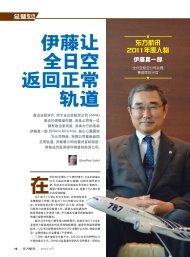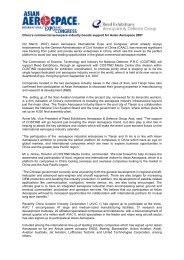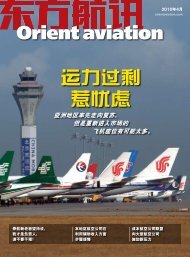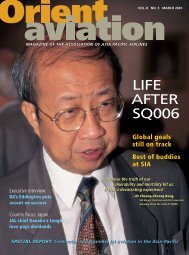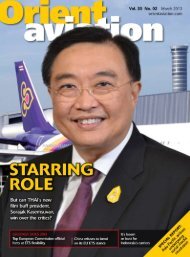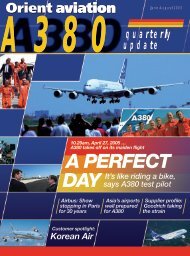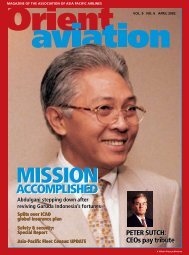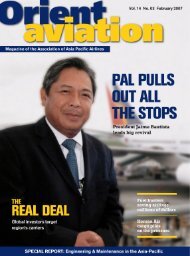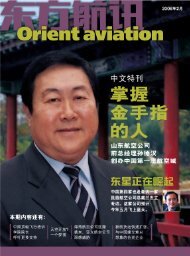Low-cost airlines in China? - Orient Aviation
Low-cost airlines in China? - Orient Aviation
Low-cost airlines in China? - Orient Aviation
Create successful ePaper yourself
Turn your PDF publications into a flip-book with our unique Google optimized e-Paper software.
‘In the last<br />
decade the gap<br />
between the<br />
strong carriers<br />
<strong>in</strong> Asia and some<br />
of the others<br />
has widened’<br />
– Rod Edd<strong>in</strong>gton<br />
Air NZ executed its right of first offer on<br />
Ansett and SIA was out of the picture.<br />
The rest, as they say, is history.<br />
In spite of his present position as<br />
chief executive of Europe’s second largest<br />
carrier, Edd<strong>in</strong>gton reta<strong>in</strong>s close l<strong>in</strong>ks<br />
with Asia, not least of which are his<br />
Korean-born wife, whom he met while<br />
at Cathay Pacific, and the numerous bus<strong>in</strong>ess<br />
l<strong>in</strong>ks with Hong Kong and Australia<br />
that he has ma<strong>in</strong>ta<strong>in</strong>ed. He rema<strong>in</strong>s on<br />
the boards of Murdoch’s News Corp<br />
and John Swire & Sons, which controls<br />
Cathay Pacific. Edd<strong>in</strong>gton also is chairman<br />
of the EU Committee of the Hong<br />
Kong Trade Development Council and is<br />
considered by many <strong>in</strong>formed observers<br />
to be one of Hong Kong’s most ardent<br />
and effective advocates <strong>in</strong> Europe.<br />
Indeed, when <strong>in</strong>terviewed by <strong>Orient</strong><br />
<strong>Aviation</strong> days before leav<strong>in</strong>g Cathay Pacific<br />
for Ansett <strong>in</strong> late 1996, Edd<strong>in</strong>gton<br />
said: “My emotional attachment to the<br />
airl<strong>in</strong>e will be with me for ever.”<br />
“The good th<strong>in</strong>g about my job is that<br />
it provides me with lots of opportunities<br />
to travel to Asia,’’ Edd<strong>in</strong>gton said when<br />
<strong>in</strong> Hong Kong <strong>in</strong> December. He was there<br />
to attend BA’s annual board meet<strong>in</strong>g and<br />
he had selected the venue. ‘’I’ve kept up<br />
my Hong Kong connections, not only<br />
through friends, but through the th<strong>in</strong>gs I<br />
do to support Hong Kong <strong>in</strong> Europe.’’<br />
“Hong Kong is a vibrant, energetic<br />
place. I met my wife here and both my<br />
children were born here. Yeah, I th<strong>in</strong>k<br />
that if you live <strong>in</strong> Asia for as long as I<br />
have, Asia does become part of you,’’<br />
said Edd<strong>in</strong>gton.<br />
“I left Hong Kong literally <strong>in</strong> the first<br />
couple days of 1997, but I’ve kept very<br />
much <strong>in</strong>volved <strong>in</strong> it. One of the th<strong>in</strong>gs I<br />
do <strong>in</strong> Europe is chair the EU-Hong Kong<br />
committee, so I’ve kept alive an <strong>in</strong>terest<br />
<strong>in</strong> Hong Kong and Asia, generally,’’ he<br />
added.<br />
Does Edd<strong>in</strong>gton miss Australia, his<br />
native homeland? Chances to go back<br />
are few and far between. “I get back<br />
there once a year. My mother still lives <strong>in</strong><br />
Perth so I try to get home to see her for<br />
Christmas and New Year,’’ he said. In any<br />
case, he hasn’t lived <strong>in</strong> Australia much<br />
s<strong>in</strong>ce he left Perth’s University of Western<br />
Australia <strong>in</strong> 1974 for the greener<br />
pastures of Oxford University.<br />
And then, of course, he lived <strong>in</strong> Hong<br />
Kong and Asia for a large part of his<br />
work<strong>in</strong>g life, which makes him a unique<br />
witness to the growth of Asia’s major<br />
<strong>in</strong>ternational carriers as they broke <strong>in</strong>to<br />
the ranks of <strong>in</strong>ternationally acclaimed<br />
<strong>airl<strong>in</strong>es</strong> over the past two decades.<br />
So just how have Asia’s <strong>airl<strong>in</strong>es</strong><br />
changed over the course of Edd<strong>in</strong>gton’s<br />
career <strong>in</strong> the region?<br />
“I don’t th<strong>in</strong>k anyth<strong>in</strong>g’s changed<br />
very substantially over the last few years.<br />
There’s strong competition here. I th<strong>in</strong>k<br />
the strong Asian carriers set the standards<br />
<strong>in</strong> the <strong>in</strong>dustry, whether they are<br />
standards of profitability or standards<br />
of service. So it’s a very competitive<br />
environment <strong>in</strong> which to operate,’’ said<br />
Edd<strong>in</strong>gton.<br />
“The issues that may have been perceived<br />
as challenges through the 60s and<br />
70s, like political stability and the like,<br />
are no longer issues. And most of the<br />
major countries are stable politically and<br />
economically. So really, when you talk<br />
about challenges – if you are operat<strong>in</strong>g<br />
<strong>in</strong>to Asia, whether you are com<strong>in</strong>g from<br />
North America and Europe, the major<br />
challenge is the quality of competition,’’<br />
he said.<br />
One th<strong>in</strong>g that has happened <strong>in</strong><br />
Asia, however, is that the strong <strong>airl<strong>in</strong>es</strong><br />
have grown stronger and the<br />
weak, well, weaker. “One of the th<strong>in</strong>gs<br />
that has happened <strong>in</strong> Asia over the last<br />
decade, is the gap between the strong<br />
carriers <strong>in</strong> Asia and some of the others<br />
has widened.’’<br />
‘’If you go back 20 years, <strong>airl<strong>in</strong>es</strong><br />
like Philipp<strong>in</strong>e Airl<strong>in</strong>es were much more<br />
robust and competitive than they are<br />
today. Even for an airl<strong>in</strong>e like Thai Airways<br />
International, 20 years ago it was a<br />
strong competitor to Cathay Pacific and<br />
S<strong>in</strong>gapore Airl<strong>in</strong>es,’’ he said. S<strong>in</strong>ce then<br />
though, “Cathay and S<strong>in</strong>gapore, and <strong>in</strong>creas<strong>in</strong>gly<br />
Dragonair, which has grown<br />
and prospered over the last decade,’’<br />
have widened the gap. “The gap has<br />
grown between the well-organised and<br />
well-run <strong>airl<strong>in</strong>es</strong> and their major regional<br />
competitors,’’ said Edd<strong>in</strong>gton.<br />
Let this be a warn<strong>in</strong>g to all <strong>airl<strong>in</strong>es</strong><br />
compet<strong>in</strong>g, or want<strong>in</strong>g to compete, <strong>in</strong><br />
Asia: “If you want to compete with them,<br />
you can’t afford to stand still. While others<br />
have had trouble over the years, or<br />
have struggled, Cathay and S<strong>in</strong>gapore<br />
have put up plenty of distance,’’ declared<br />
the BA boss.<br />
Good advice. But learn<strong>in</strong>g to keep<br />
pace with the leaders is one th<strong>in</strong>g, f<strong>in</strong>d<strong>in</strong>g<br />
opportunities to overtake them another<br />
altogether. What opportunities does Edd<strong>in</strong>gton<br />
see <strong>in</strong> Asia for <strong>airl<strong>in</strong>es</strong>?<br />
“The opportunities have <strong>in</strong>creased.<br />
Clearly, the opportunities that exist<br />
around bus<strong>in</strong>ess <strong>in</strong>to and out of Ch<strong>in</strong>a<br />
are hugely ahead of where they were a<br />
decade ago,’’ he said.<br />
“Of course, a decade ago Japan was<br />
very much the eng<strong>in</strong>e room of Asia and<br />
it’s critical to most Asian <strong>airl<strong>in</strong>es</strong> and<br />
Asian economies. But the major Asian<br />
<strong>airl<strong>in</strong>es</strong> have relatively fewer eggs <strong>in</strong> the<br />
Japan basket than they had 10, 20 years<br />
ago. Back then, it was pretty much Japan,<br />
economy number one, and then a big gap<br />
to the next. But now you have Ch<strong>in</strong>a, you<br />
have Japan, you have Korea, all quite<br />
apart from places like Hong Kong. So<br />
there are terrific opportunities <strong>in</strong> Asia,’’<br />
said Edd<strong>in</strong>gton.<br />
More to the po<strong>in</strong>t: “I look at Ch<strong>in</strong>a<br />
and ask, what are the opportunities? Increas<strong>in</strong>gly,<br />
European <strong>airl<strong>in</strong>es</strong> are look<strong>in</strong>g<br />
to drive tourism from Ch<strong>in</strong>a, but the real<br />
opportunities <strong>in</strong> Ch<strong>in</strong>a have come from<br />
with<strong>in</strong> Asia.’’<br />
‘’Look at the network that Dragonair<br />
has <strong>in</strong>to Ch<strong>in</strong>a now, and similarly that of<br />
Japan Airl<strong>in</strong>es, Korean Air and Asiana<br />
have <strong>in</strong>to Ch<strong>in</strong>a today. These are not just<br />
to places like Shanghai and Beij<strong>in</strong>g and<br />
Edd<strong>in</strong>gton <strong>in</strong> Hong Kong with (from left): Guy McLeod, president Airbus Ch<strong>in</strong>a, Robert<br />
Adams, director CITIC and Mart<strong>in</strong> Craigs, president Aerospace Forum Asia<br />
February 2003, <strong>Orient</strong> <strong>Aviation</strong> 33


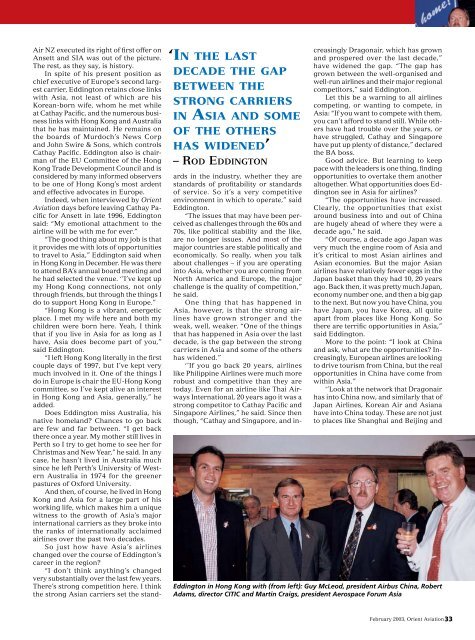
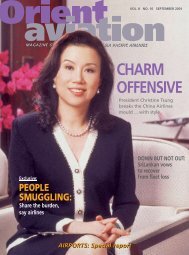
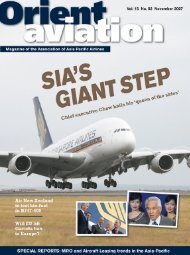
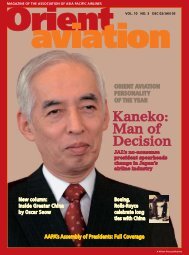
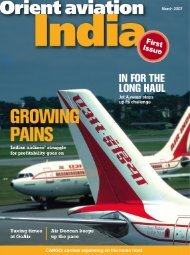
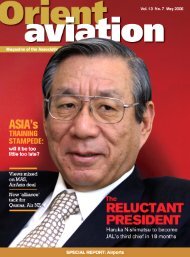
![OAMag-V7N4-Cover [Converted] - Orient Aviation](https://img.yumpu.com/48598575/1/190x255/oamag-v7n4-cover-converted-orient-aviation.jpg?quality=85)
